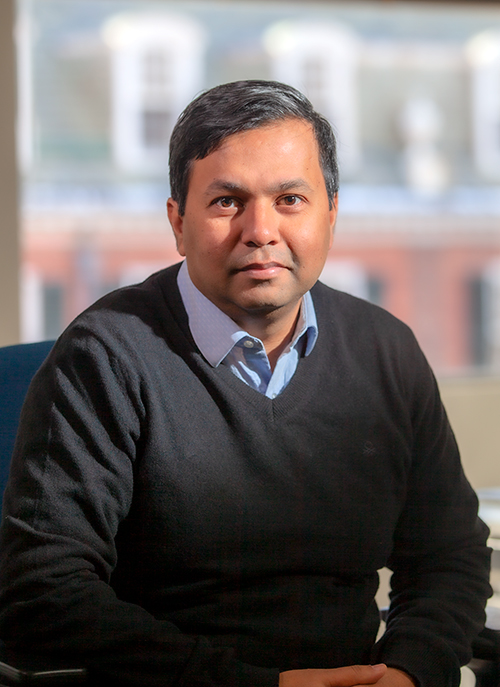Yale Scientists Take Lead Roles in Two NSF-Funded AI Institutes

Yale researchers are taking a major role in two artificial intelligence (AI) institutes, each funded by the National Science Foundation (NSF).
The NSF announced today that it is investing $220 million to establish 11 AI institutes, each receiving $20 million over five years. Yale researchers are taking leadership positions in two of these institutes, one of which will focus on optimization, and another dedicated to edge computing and computer network systems. Eight Yale scientists in total are members of the institutes.
The 11 institutes are focused on AI-based technologies poised to produce a range of advances, from helping older adults lead more independent lives, to improving agriculture and food supply chains, to increasing equity and representation in AI research.

Nisheeth Vishnoi, the A. Bartlett Giamatti Professor of Computer Science, is co-principal investigator for the Institute for Learning-Enabled Optimization at Scale (TILOS). Partially funded by Intel, TILOS aims to “make impossible optimizations possible” by addressing the fundamental challenges of scale and complexity. Led by the University of California San Diego, TILOS partners also include the Massachusetts Institute of Technology (MIT); San Diego-based National University; the University of Pennsylvania; and the University of Texas at Austin. Yale professors Daniel Spielman and Amin Karbasi will serve with institute’s “Foundations” team, with Vishnoi as the team’s co-lead.
“The goal for the Foundations team is to push the mathematical frontiers of optimization into the next century,” Vishnoi said. While decades of work in optimization have driven technology in chips, networks, and robotics, the demand on optimization models and methods from these areas has become much higher with today’s technology.
“In the last few years, the scales of these problems have gone berserk,” said Vishnoi. “The size of optimization problems that arise in these application areas have really gone out of bounds for traditional optimization methods. In the last decades, we’ve been independently trying to develop optimization methods in a variety of different settings that tackle this problem of scale, as well as other issues - uncertainties associated with data, dynamic learning environments, and distributed computational frameworks.”
Further, he mentions that traditional optimization methods typically work in settings where the domain is flat. In modern settings, the domain can often be curved. “You are no longer working in the normal space, but in a complicated geometry - so you need new methods and new models.”
Lin Zhong, professor of computer science, is co-principal investigator for the AI Institute for Edge Computing Leveraging Next-generation Networks (also known as the Athena Institute). Yale professors Leandros Tassiulas, Abhishek Bhattacharjee, Anurag Khandelwal, and Wenjun Hu are also institute members. With Duke University as the lead institution, other partners are MIT, Princeton University, University of Wisconsin, University of Michigan; and North Carolina A&T State University. It is partially funded by the U.S. Department of Homeland Security.

The Athena Institute will focus on using and advancing AI technologies to develop edge computing - that is, computing done at or near the source of the data, rather than relying on a distant data center - while keeping complexity and costs under control. Essentially, it would bring cloud computing closer to users. Zhong said doing so could have significant benefits, such as shorter latency and higher efficiency in cloud computing, which empowers novel services such as virtual reality, autonomous vehicles and drones. And by making the necessary technology more accessible, it potentially creates a more level playing field for start-up companies.
“We think this should transform the national infrastructure for cloud computing and mobile networking,” said Zhong, the lead researcher for Yale. “But it’s not easy - there are many challenges and the Athena Institute is about tackling those challenges and tapping into the power of AI.”
Zhong noted that the Athena Institute, as well as many other announced today, treat AI as a tool that is both powerful and in need of development for significant advancement in numerous fields, ranging from agriculture, to chemistry to physics.
“AI has great potential to solve numerous real-world problems,” Zhong said. “For us, it’s about how AI could help transform computer and network systems – those we use every day - and how solving problems from computer and network systems can help advance AI.”
NSF officials noted that the AI institutes are composed of researchers from 37 states, and that they are looking to expand into all 50 states.
“These institutes are hubs for academia, industry and government to accelerate discovery and innovation in AI,” National Science Foundation Director Sethuraman Panchanathan said. “Inspiring talent and ideas everywhere in this important area will lead to new capabilities that improve our lives from medicine to entertainment to transportation and cybersecurity and position us in the vanguard of competitiveness and prosperity.”

